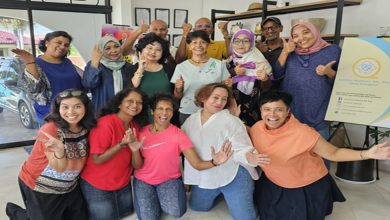

“Yes we can now use the word ‘Curable’ in cancer treatment where before we could only say ‘in remission’ when it comes to certain forms of cancer,” said Professor Dr Biswa Mohan Biswal, Consultant Clinical Oncologist & Radiotherapist at KPJ Ipoh Specialist Hospital when I caught him using the word ‘Cure’ in my recent conversation with him in his KPJ Ipoh Specialist clinic.
“Seven cancers are now highly curable. They are Childhood Leukaemia, Hodgkin’s lymphoma, Thyroid, Ovarian GCT, Testicular, Skin, and a type of uterine cancer (GTN),” he said.
The four most common cancers in Malaysia are breast, colorectal, lungs and nasopharyngeal cancers. The one cancer that Professor Biswal finds most alarming is the rising incidence of breast cancer in young women.
“It is a worrying trend and of most concern to me. Traditionally we advise women who have passed 40 to have mammograms as this is the age and beyond when women are vulnerable. But now I am seeing patients between 20 and 30 years of age presenting with breast cancer and I have even seen patients as young as 15 and 18,” he exclaimed.
Published Author
A veteran of 18 years at Hospital USM in Kelantan, Professor Biswal obtained his specialization degree from All India Institute of Medical Sciences, New Delhi, India, in 1991 and came to Malaysia in 1997 where he has been working in Kelantan and since July 2014 in KPJ Ipoh. He is a much published author in peer reviewed journals (to date 83), the author and co-author of textbooks and numerous monographs and scientific papers and the recipient of many awards and recognition honours.
Allaying Fears
“As an oncologist, I have to deal with patients’ fears about their disease in general and in the case of breast cancer in particular, women fear the loss of their femininity especially as they think they will lose their breast in a mastectomy. Hence in the past, a lot of women in Malaysia would rather go to their TCM doctor or bomoh rather than to an oncologist,” he lamented.
“But all that is changing now as more and more women are going to oncologists and are beginning to understand that the so-called disfigurement of their bodies is not a necessary outcome of treatment for breast cancer. With new techniques and new research, simple surgical removal of the tumours combined with a regime of possibly chemotherapy and or radiotherapy, will often take care of the problem. In fact in some instances, depending on the diagnostic tests from biopsies, all the feared treatments may not even be necessary as oral drugs may sometimes be effective,” Professor Biswal emphasised.
Developing Awareness in Young Women
So how do younger women become more aware of this threat? First of all according to Professor Biswal, young women who come from a family where two or more members have or have had breast cancer, should do self-examinations regularly or go for clinical breast examinations from a gynaecologist. If they can afford it, they can opt for a test to detect if they carry the defective BRCA 1&2 gene. Young breasts are often too dense for mammograms to be effective screening. Other options are ultrasound and MRI and these are options to be recommended by your doctor.
Minimising Risks
As for ways to minimise the onset of early breast cancer, Professor Biswal recommends the following lifestyle factors to watch for. These include having babies before age 28; breastfeeding your baby instead of using the bottle; watching your weight as obesity and diet have a statistical relation to breast cancer; moderate exercise of a minimum three times a week with a duration of forty five minutes.
Treatment Options
So what happens if your biopsy shows that you do have breast cancer? Today, there are further diagnoses that will indicate the best treatment options. Depending on whether the cancer has estrogen, progesterone or HER2 receptors, the treatment options will vary with positive receptor status being very receptive to drug therapy. If no receptors are detected, and most youthful breast cancers belong in this category, the cancer is very aggressive and triple negative breast cancer or TNBC is currently where most research is being focussed and hopefully a solution is on the horizon.
Integrative Approaches
And what of Integrative or Alternative Medicine I asked Professor Biswal. Is there no room for herbs or natural medicine in oncology? I asked.
“I have actually been involved in a Phase II clinical trial on the use of Withania somnifera (Ashwagandha) for patients undergoing chemotherapy and the results are encouraging. Patients experienced less side effects from their treatments which shows me that more research needs to be done in the area of adjuvant therapies in oncology”.
Staying Current
So how do you keep abreast of all that is going on in the world of oncology I asked? “As a member of the American Society of Clinical Oncology (ASCO) I try to attend their conferences annually failing which I am privy to their papers and latest research. I am willing to discuss various ways, new or traditional with my patients on what suits them best in treating their cancers. For example it is now possible to do Metronomic Chemotherapy which are tiny doses after the main treatment which minimises the side effects or we give weekly doses in smaller amounts.”
“As for the future of Oncology, my wish is for the cost of Personalized Cancer Treatment to become affordable which is cancer treatment based on genomic analysis,” concluded Professor Biswal.
Professor Dr Biswa Mohan Biswal Suite L2-08 KPJ Ipoh Specialist Hospital 26, Jalan Raja DiHilir, 30350 Ipoh, Perak Tel: 605-240 8777 ext 8329 / 8330

